How to Get Rid of Mouse & Rat Urine Smell in the Attic, Walls, & Under the House (10 Steps)
-

- Last updated:
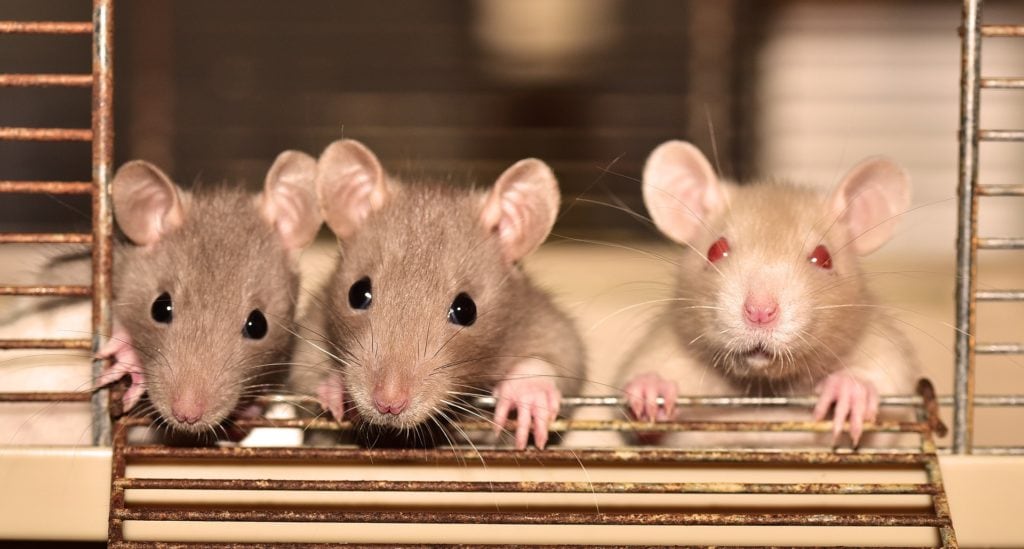
Few things are more upsetting than discovering you have a rodent problem. The droppings are a telltale sign. It’s even worse if you see one since they usually are active at night to avoid humans—and pets! Americans spend a lot of money ridding their homes of these pests. The market continues to grow, with a projected value of $217.4 million by 2025.
There are many compelling reasons to get rid of rodents if just for the damage they do. They can also transmit over 35 diseases affecting both humans and their pets. However, even controlling them has some drawbacks. That’s particularly true if the rodents die in inaccessible places, such as behind walls or under floors. Unfortunately, those are the areas they usually prefer.
Our guide will help you with this unpleasant task with suggestions for making your home livable again. We’ll also provide some tips to prevent a recurrence of this problem. However, if you have a serious infestation, we recommend that you contact a professional pest control service to get the issue under control as soon as possible.
 Before You Start
Before You Start
We’d be remiss if we didn’t say up front that you have quite a job on your hands. It will take some effort to get rid of the urine odors. And the work won’t stop there, either. You must also prevent it from happening again, which will take time. However, the payoff is a pleasant-smelling home and an elimination of the health risks that rodents pose. It’s worth it in the long run.
Our list of steps includes some that may not apply to all situations. We have provided them so that you know what to do if you find yourself dealing with the problem in these cases. Our advice is not to skimp. A thorough cleaning is imperative to get rid of the odors. You may not notice them in the spring when you have the windows open. However, you will detect them during the winter. There are also risks.
Inhalation of rodent waste or contamination from skin contact can cause potential harm to you. We suggest that you keep small children and pets from the places you will be working. Undoubtedly, you’ll find a nasty surprise or two. The supplies that you will need include:
- UV LED flashlight urine detector
- Rubber gloves
- Mask
- Garbage bags
- Newspapers or a dropcloth
- Sponges and rags
- Broom and dustpan
- Bleach
- Odor eliminator
- Bucket
- Mop
Find a pest-control specialist in your area, and get free, no-commitment estimates for your project.Consult a PEST-CONTROL expert

How to Get Rid of Mouse & Rat Urine Smell in the Attic, Walls, & Under the House in 10 Steps
1. Air Out the Rooms
Begin by airing out the rooms where you will be working. It will reduce the concentration of harmful particles and make your job less unpleasant if the odors are particularly strong. Give it a good half hour or so before you start.
2. Locate the Source
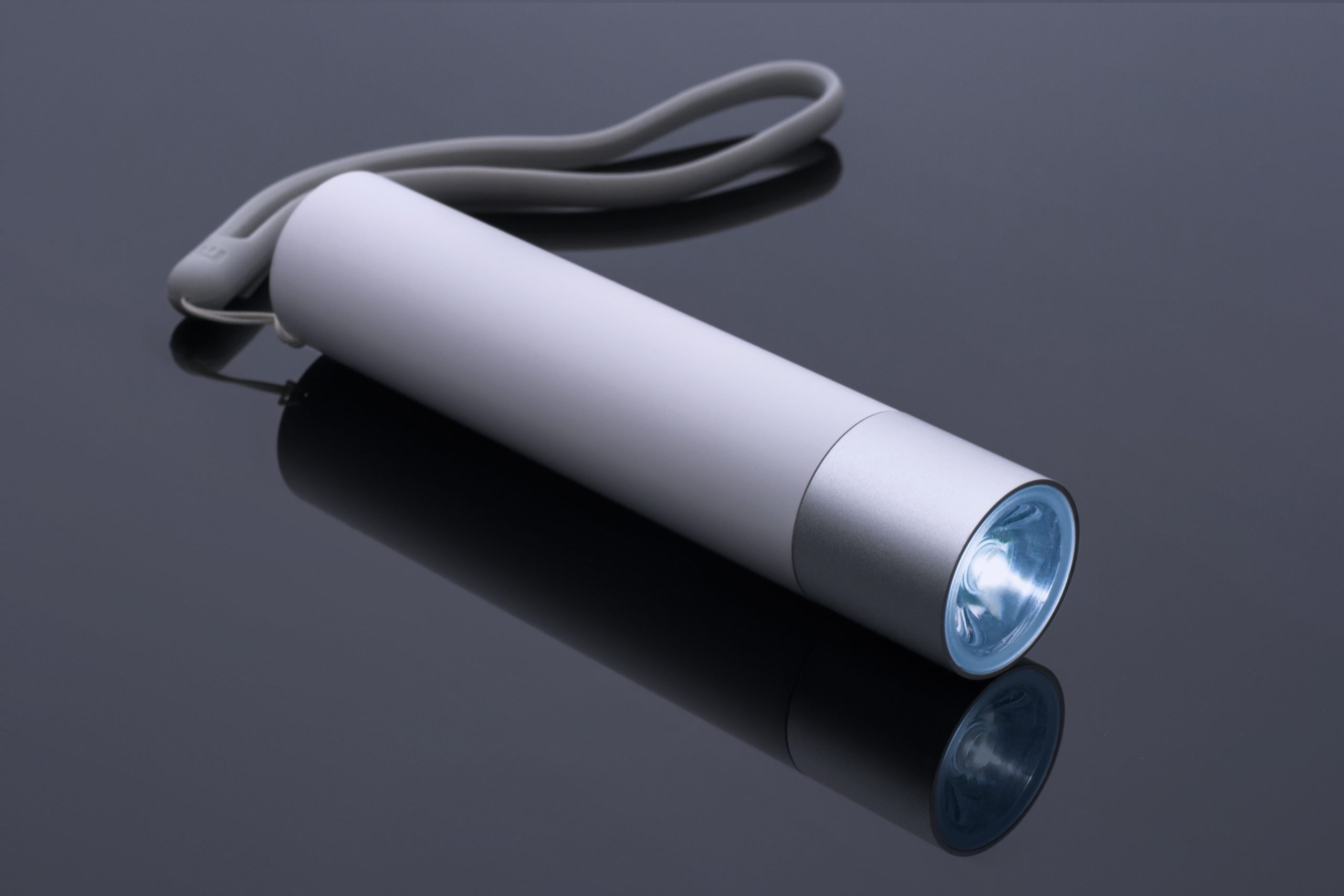
The first step toward eliminating a urine problem is locating the source. A UV LED flashlight specific for detecting waste will make this job easy. It’s not an ordinary light. Instead, it can emit a particular wavelength that will illuminate the urine crystals. It works for pets, too. It’s a handy tool that you can use throughout your home to find out where the rodents are hiding.
Good places to look are under the kitchen sink, near garbage cans, and pantries. Rodents usually move along walls instead of in the middle of a room. Other likely sites are under appliances. Of course, if you’ve seen any damage, there are probably stains there, too.
3. Prepare Yourself for Battle
We suggest wearing long pants and a long-sleeved shirt. It’s going to get messy out there. Rubber or vinyl gloves are a must-have. You should also wear a mask if you’re going to work in enclosed spaces, such as under the sink. Ensure that the room is well-lit, so you don’t miss anything. Gather the supplies you’re going to use to have them handy.
4. Remove Visible Signs of the Rodents
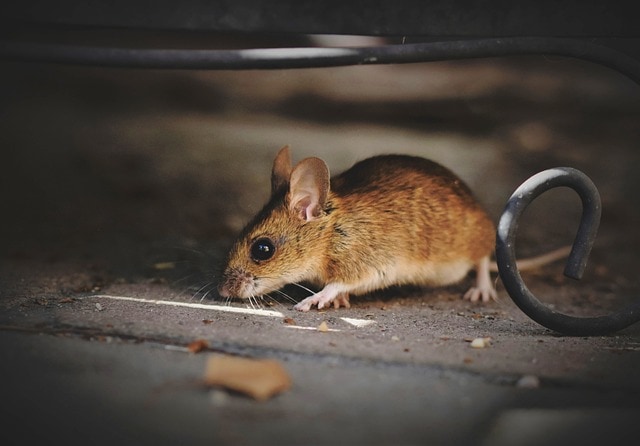
Look for any visible signs of rodent activity, such as nests, chewed materials, or damaged foodstuffs. If you find holes in one item, they’ve probably been through everything around it. Toss out anything you find in a garbage bag. Areas where you store food or garbage are prime candidates. Take out any other things in the cabinet or pantry. You may find it helpful to place them on newspapers or a dropcloth.
Sweep the floor or use a brush with a dustpan to clean out under the sink or other cabinets. Try to avoid any contact with the waste.
5. Wash Down the Surfaces With a Bleach Solution
Prepare a mild 1:10 bleach-water solution. Wipe down all surfaces where you detected urine in Step 1. If you’re cleaning a cabinet, make sure to wash down all walls. Mop the floor, particularly along the baseboards. We also suggest washing them. It’s a good time to look for any signs of damage, such as openings where the rodents are getting access to the room. Allow any cabinets to air out for a while.
Alternatively, you can use a urine remover product. They differ from other household cleaners because they contain enzymes specific for eliminating these kinds of odors. Avoid using ammonia or vinegar, which can make the problem even worse. Wash down all surfaces in any room where you’ve detected rodent urine.
6. Throw Out Any Chewed Perishable Items
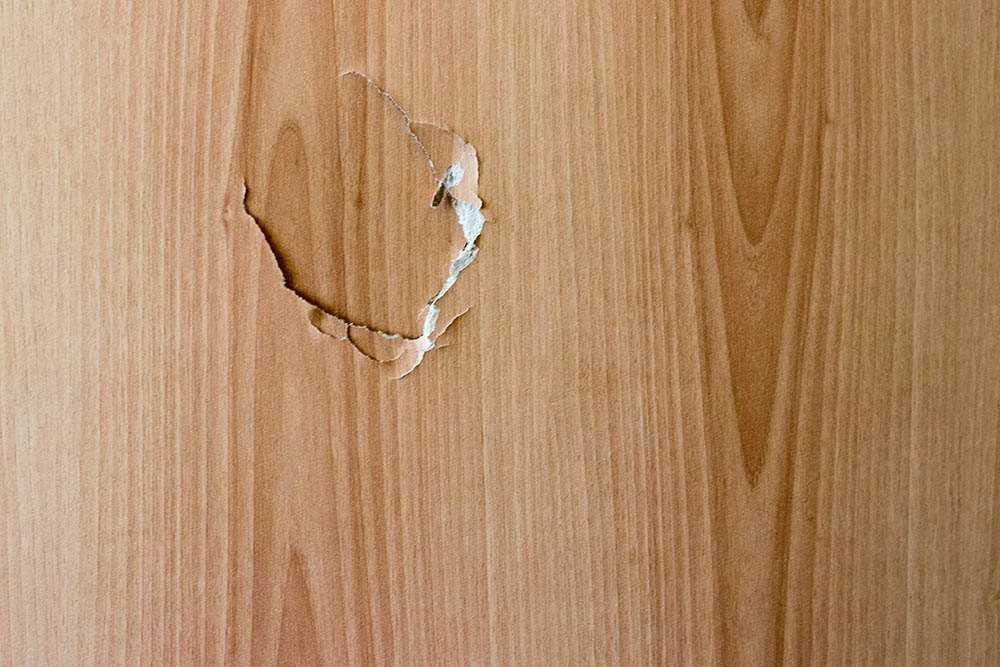
Get rid of any materials such as cardboard boxes, even if you didn’t detect urine on them with the flashlight. The chances are they will absorb odors in the air. The same thing applies to any plastic containers with gnawing marks on them. Put anything you’re going to discard in the same garbage bag as the other waste.
7. Wash Any Linens, Throw Rugs, or Blankets in the Rooms
If you’ve found signs of rodents under your sink, you should wash the throw rug in front of the area. We also suggest washing any dishcloths, placemats, or towels in the kitchen if you’ve detected rodent urine in this room. Mice are quite mobile and can just onto surfaces easily. If possible, use hot water and color-safe bleach for the best results.
8. Steam Clean Any Furniture and Carpets
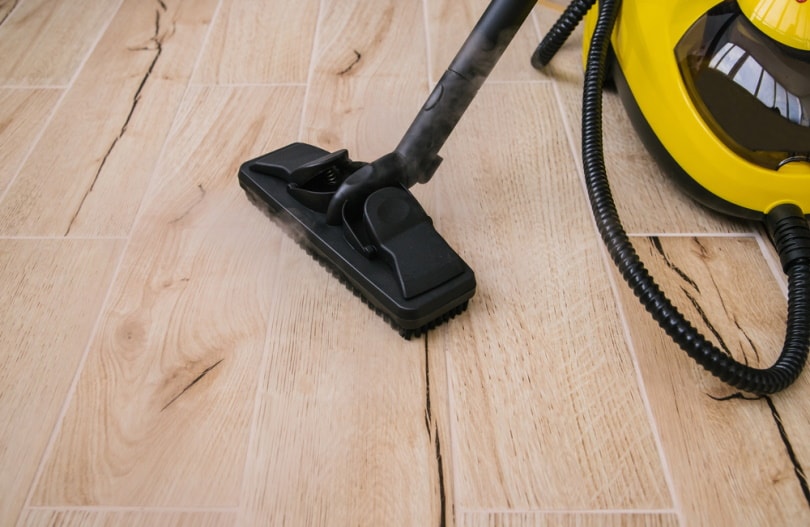
If you’ve detected rodents in other living areas, they will need the same treatment. We suggest vacuuming and then steam cleaning all carpeting and furniture in adjacent rooms. That’s particularly true if your family eats or enjoys snacks in these places. Rodents are opportunistic feeders that will hunt everywhere for food.
Empty the vacuum canister or bag into the other trash you’ve collected so far. If possible, rinse it out with your bleach solution before replacing it.
9. Have Your Duct Work Checked
Rodents often live in inaccessible areas in your home, including places such as your ductwork. It’s not a DIY job to get deep inside the bowels of your house. We recommend calling in the professionals. Undoubtedly, they are experienced in dealing with rodent issues. If you’re still smelling an odor, that’s probably the source.
10. Stay on Top of Any Issues.
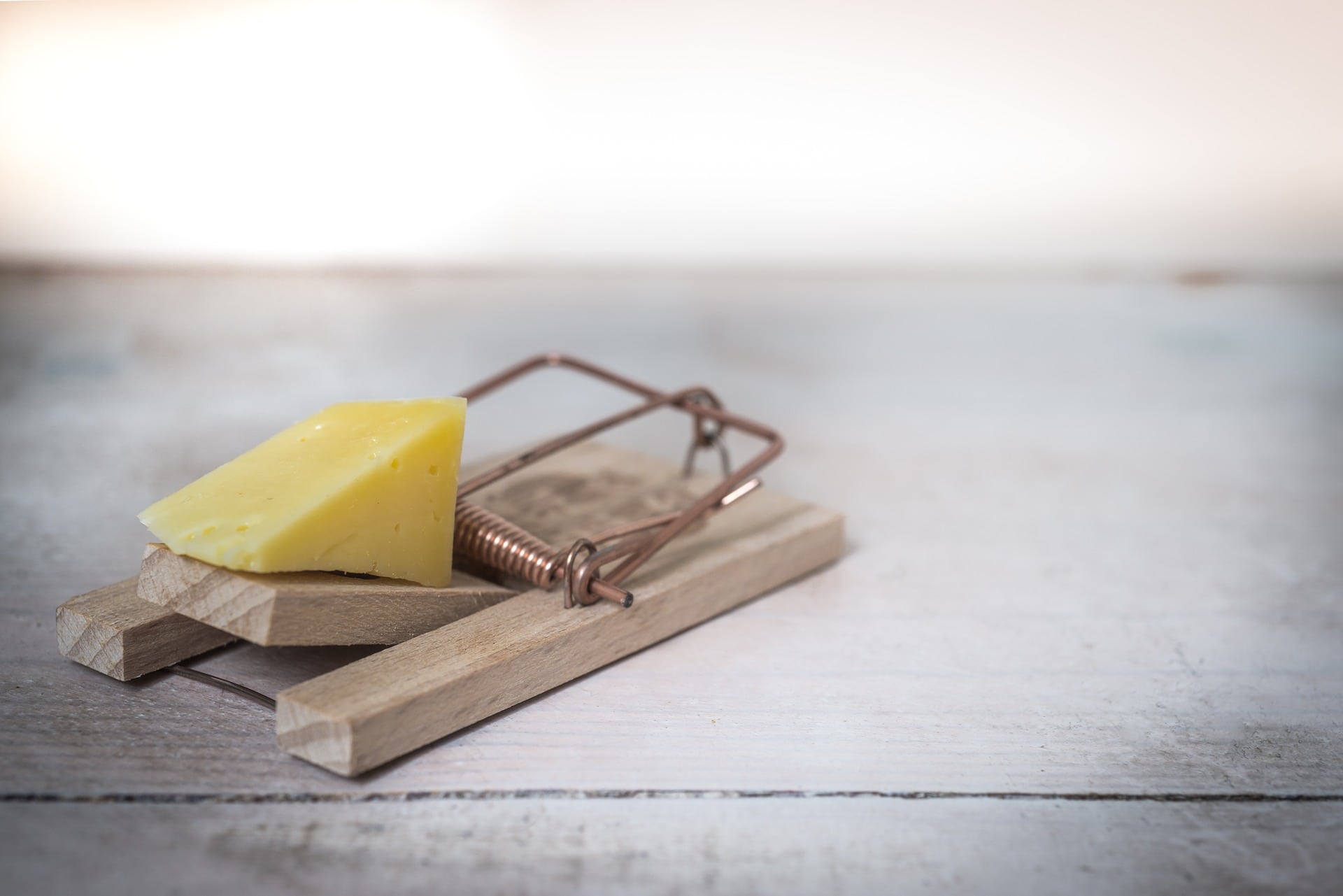
Everything you’ve done up to now is for naught unless you prevent it from happening again. The Centers for Disease Control and Prevention (CDC) recommend a four-prong approach. It starts with sanitation, which your work has accomplished. The takeaway is to keep up with the cleaning. You may find it helpful to check the rooms and places where you’ve detected rodents occasionally.
Preventing Future Problems
The other thing you must do is make your home inhospitable to pests. Rodents invade your house to get three things necessary for survival: food, water, and shelter. Keeping food off of the counters is an excellent first step. We also strongly urge you to take out the trash every night. Picking up your pet’s food bowl every night will also deter rodents. The same precaution applies if you feed your dog outdoors.
The CDC also recommends rodent-proofing your home. The first step is eliminating any way they could get inside your house. We suggest walking the perimeter of your home, looking for any cracks or holes. Make sure to seal up anything that you find. You can also prevent a rodent problem by keeping the landscaping trimmed or away from your foundation. That can provide a pathway to get into your house.
Finally, it’s imperative to control the problem if you have an active infestation. Unfortunately, there isn’t an ideal way to handle it. Glueboards are messy and inhumane. Live trapping is a waste of time with rodents. You can use poisons if you don’t have small children or pets. The only thing is that a rodent can die behind a wall and cause a different type of issue.
Perhaps the best way is to use killing traps. It will prevent the above problem and eliminate the pest. Place them where you initially found the rodent urine. Just be sure to check them every day. As with cleaning, you should wear gloves when handling the traps.
 Final Thoughts
Final Thoughts
Dealing with a rodent issue is challenging enough without the problem of lingering odors. That’s why you must include prevention as part of your plan. It’s the only way to ensure that you won’t have to go through this ordeal again. The less inhospitable you make your home, the more likely the mice and rats will look elsewhere for more accessible food, water, and shelter.
- Read Also: How To Get Rid Of Rat Urine Smell In 5 Steps
Featured Image Credit: Pixabay
Contents
 Before You Start
Before You Start